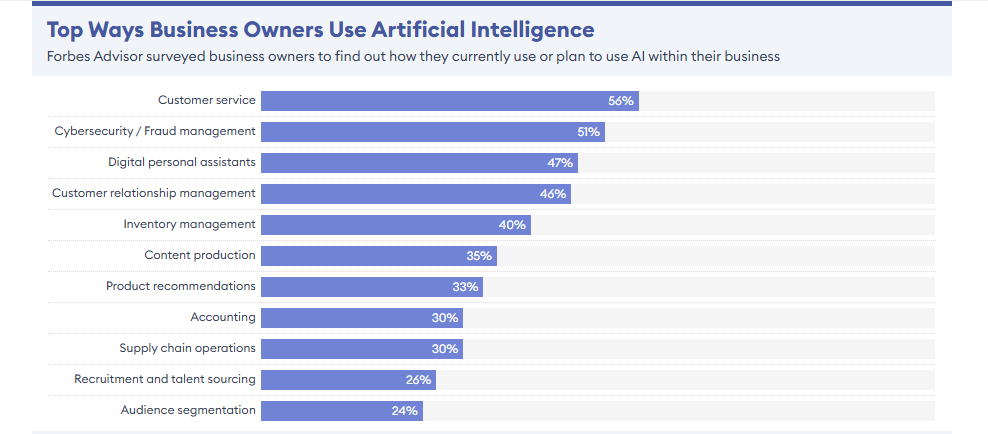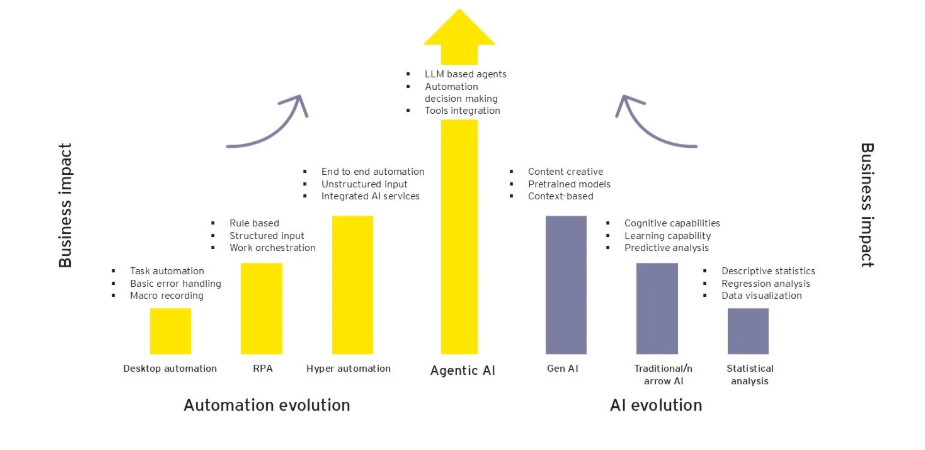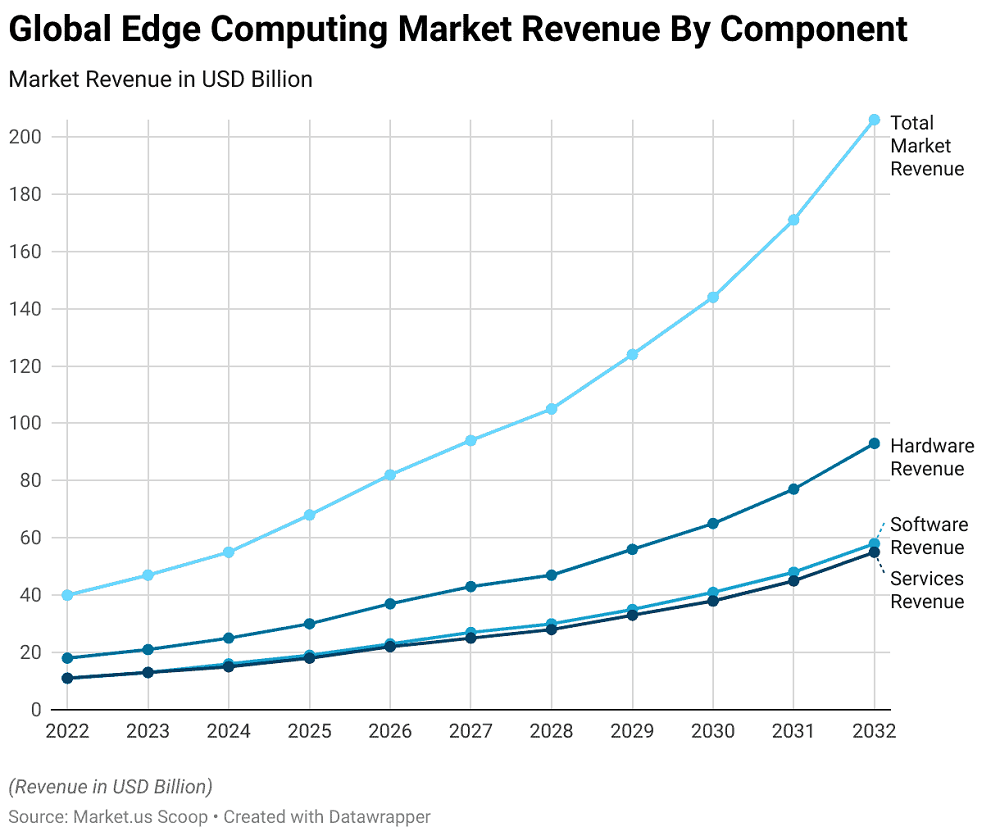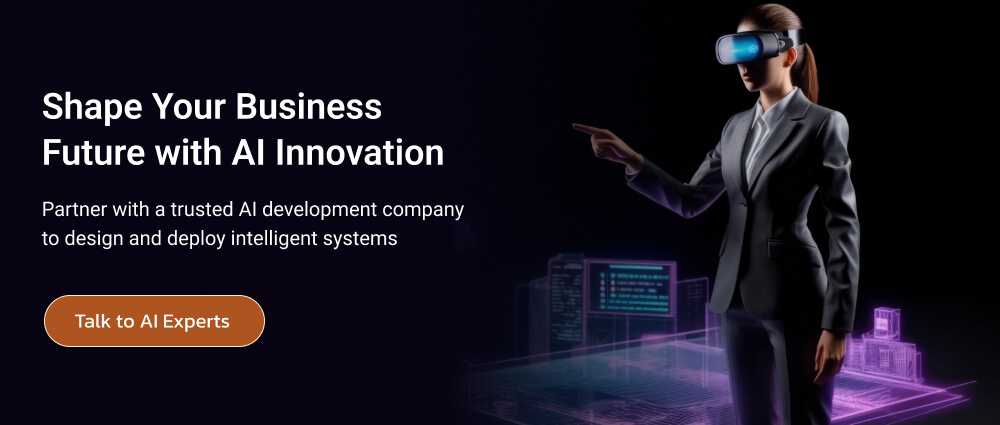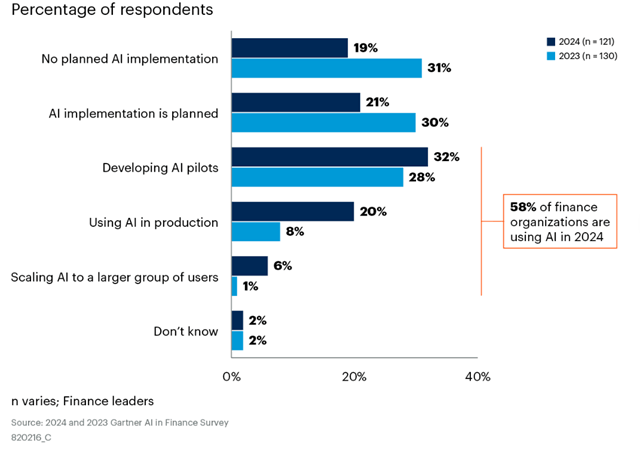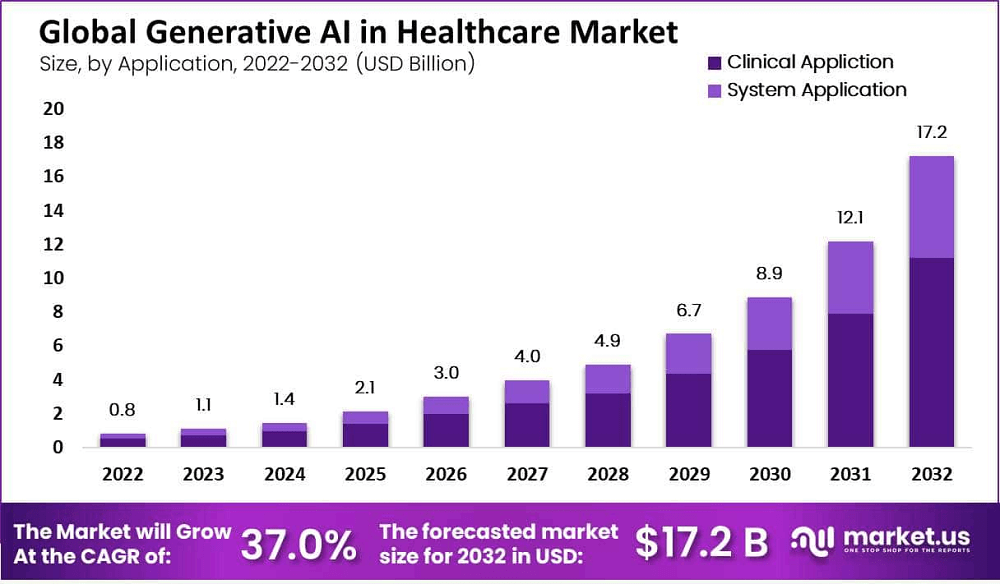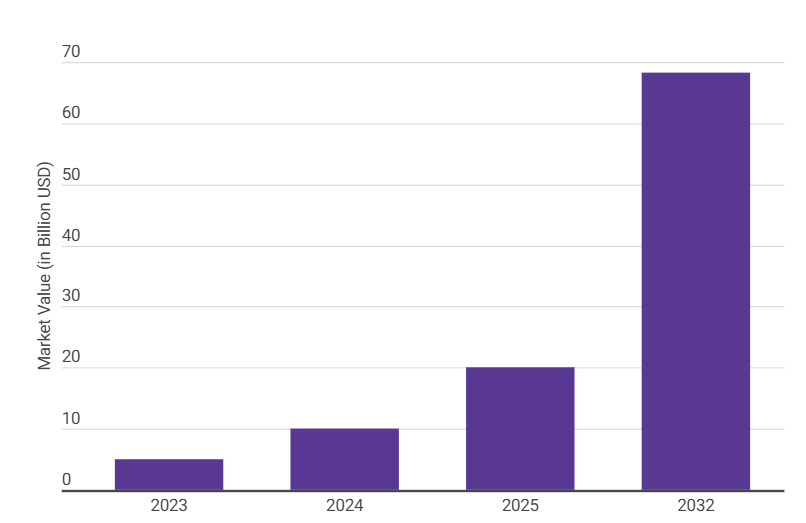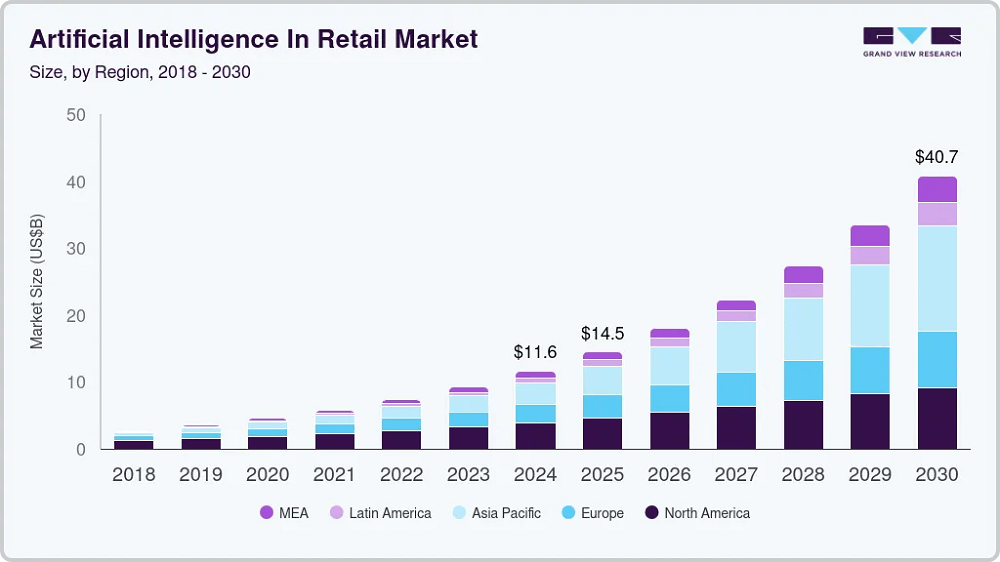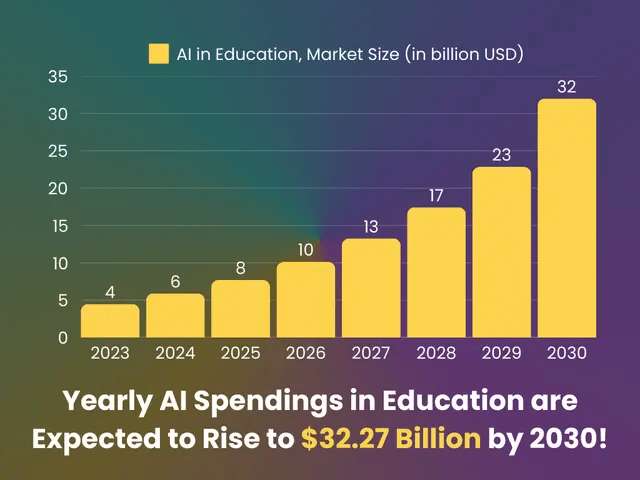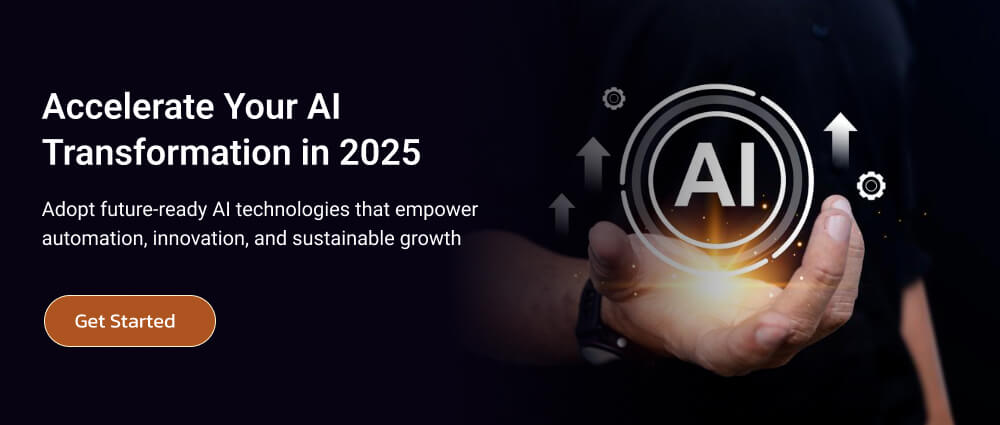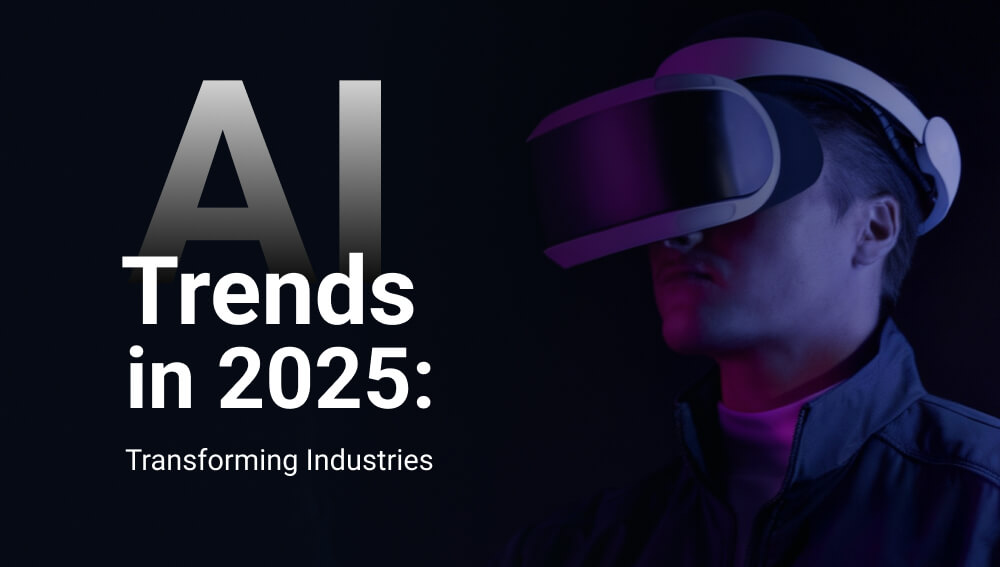
Artificial Intelligence has transitioned from being a powerful experimental tool to becoming the backbone of business infrastructure and digital transformation. Across industries, AI is no longer a technology change but an operational necessity. From autonomous Agents to multimodal intelligence, 2025 is the moment when businesses move from experimenting with AI to relying on it completely. Integrating AI into business operations is a complex process that needs significant investment and expertise. The key challenges experienced are data privacy, ethical standards, and technical skills. Despite these challenges, the use of AI technologies has doubled since 2023, with nearly 65% of companies already adopting them.
As organizations seek to stay competitive and agile, understanding the latest Artificial Intelligence trends and their enterprise impact is crucial. In this blog, we will explore the major ones defining this transformative year with the latest market statistics and their impact on different industries.
Top AI Statistics of 2025 and Beyond
AI’s rapid advancement and potential to change the workflow are quickly transforming different industries. The most common use cases, as per the Forbes Advisor survey, are customer service, cybersecurity, and fraud management.
With AI, remarkable use cases across industries drive innovation, automation, and efficiency.
- 97% businesses consider ChatGPT will positively impact their business in multilingual content creation.
- 60% businesses see AI as a tool to personalize customer relationships.
- 50% business owners are experiencing a surge in productivity with AI.
Latest Trends in Artificial Intelligence to Watch in 2025
AI is redefining industries with smarter workflow processes and advanced solutions. Every business seeking competitive growth must be aware of the AI technology trends for 2025.
1. Multimodal Intelligence
In 2025, intelligence isn’t one-dimensional. The blend of visual, auditory, and textual data has given rise to multimodal AI systems. These systems combine multiple forms of input to deliver more contextual and accurate insights.
For example, in healthcare, multimodal AI monitors radiology scans alongside patient history and voice notes to deliver accurate diagnostics. In retail, it analyzes video feeds, purchase history, and sentiment analysis to bring predictive personalization.
This shift marks one of the key AI innovations to watch in 2025. By breaking the silos between data modalities, enterprises gain a deep understanding that brings AI decision-making closer to human-like intuition.
2. Conversational AI
Conversational AI continues to evolve as the latest advancements in AI technology for 2025. With advanced NLP and emotion recognition, chatbots and virtual assistants have become more context-aware and adaptive.
Modern conversational AI can recall historical data, interpret tone, and even detect intent ambiguity. This makes them a crucial addition for industries like banking, healthcare, and eCommerce.
Brands are integrating Chatbot development services with Generative AI solutions to build dynamic, personalized customer engagement experiences. According to Grand View Research, by 2030, the chatbot market size will reach $27.2 million.
3. Agentic AI for Autonomous Execution
One of the Emerging AI Technologies of 2025 is the rise of Agentic AI that can reason, plan, and execute autonomously. These intelligent agents initiate actions, manage workflows, and optimize decisions without human intervention.
Imagine a marketing AI that monitors performance metrics, reallocates ad budgets, and adjusts creatives in real-time without any human assistance. Moreover, an operations agent who proactively identifies supply chain delays and reconfigures routes. This AI evolution represents the next wave of business transformation, where automation becomes autonomy.
Leading enterprises are consulting AI agent development services to design domain-specific autonomous systems for finance, logistics, and customer service.
Also Read: Data Privacy & Governance in Agentic AI
4. Predictive Analytics for Data Insights
In 2025, predictive AI models will assist organizations in anticipating behavior, detecting risk, and forecasting demand for seamless business operations. With enhanced model accuracy and federated data learning, businesses can now make future-ready AI technologies central to decision-making.
In retail, predictive models are optimizing inventory and pricing. In healthcare, they’re forecasting patient outcomes. In cybersecurity, they’re predicting breach attempts before they occur.
This active use in different industries marks predictive analytics as one of the most practical AI technologies transforming businesses in 2025, bridging the gap between descriptive insight and proactive intelligence.
5. Edge AI for Deep Intelligence
The migration of intelligence from the cloud to the edge is transforming enterprises to build resilient systems. Edge AI allows devices to process data locally, reducing latency, improving security, and enabling real-time responsiveness. This is critical in manufacturing, autonomous vehicles, and IoT ecosystems. The market size of Edge computing will reach $206 billion in 2032 from $55 billion in 2024.
Edge computing is merging with AI app development company expertise to create hybrid architectures where cloud and edge systems collaborate seamlessly. This major collaboration enhances scalability while ensuring compliance with data ethics. Compliance laws are very much crucial in sectors like healthcare and finance. Edge AI is one of the key AI adoption trends across industries, driving decentralized architectures that empower data privacy and business agility.
6. Generative AI for Advanced Data Creativity
Generative AI has matured into one of the latest artificial intelligence trends, reshaping creativity and content production. The initial usage around text and image generation has transformed into sophisticated co-creation models. This latest AI advancement assists in product design, simulation modeling, and even code generation.
Brands are leveraging Generative AI solutions for personalized marketing, rapid prototyping, and digital twin creation. Unlike its early versions, Generative AI 2.0 emphasizes content authenticity, ethical generation, and brand coherence.
7. Cybersecurity to Predict & Prevent Threats
Even with technological advancement, businesses experience serious threats, putting valuable data at risk. As cyber threats grow more advanced, AI has become both the shield and the sword. The cutting-edge AI technologies deploy behavioral analytics, anomaly detection, and autonomous response mechanisms to counterattack vectors.
The impact of AI trends on digital transformation is evident in cybersecurity, where defense is now predictive rather than reactive. AI systems analyze millions of signals coming from different networks, user behavior, and system logs to identify anomalies. These systems continuously learn, adapting to new attack patterns without manual updates. Organizations are investing in AI integration solutions that embed threat intelligence directly into their enterprise infrastructure.
8. Facial Recognition Building Intelligent Identity
Facial recognition technology has rapidly evolved into one of the most successful emerging AI tools and platforms of 2025. Powered by advanced computer vision and deep learning models, it’s now being used far beyond surveillance.
Enterprises are integrating facial recognition for personalized user experiences, secure authentication, and real-time identity verification. In retail, it’s helping deliver hyper-personalized in-store experiences. In finance and healthcare, it strengthens compliance and fraud prevention. Even in smart cities, it’s enhancing safety and streamlining access control.
What sets 2025 apart is the focus on ethical and transparent use. It ensures facial recognition systems respect privacy, reduce bias, and comply with global data regulations. When implemented responsibly, it bridges convenience and security, offering a seamless balance between human experience and digital protection.
AI Across Industries – Transforming Operations, Security, and Experience
Artificial Intelligence has evolved into an operational engine across sectors. From finance to healthcare, industries are redefining efficiency, personalization, and resilience through data-driven intelligence. No sector is untouched by AI technology advancements in 2025.
1. AI in Finance for Secure Transactions
In 2024, around 91% of financial organizations either planned or had already integrated AI into their operations. The market for AI in finance is growing rapidly and is expected to exceed $22.6 billion by 2026, with a strong 25.7% CAGR.
AI is helping financial institutions improve work automation, deliver more personalized services, and strengthen risk management. Among these, enhancing security has proven to be the most critical and effective. Nearly 87% of financial businesses are using AI for fraud detection and anti-money laundering, making it one of the most impactful areas of adoption in the sector.
2. AI in Healthcare for Personalized Care
Traditionally, the healthcare industry has been cautious about adopting new technologies due to strict regulations. However, that’s changing quickly. The AI in healthcare market is projected to soar to $194.4 billion by 2030, driven by the growing need for automation and digital efficiency.
The combined impact of digital transformation and the COVID-19 pandemic has pushed healthcare organizations to implement AI models for faster, more accurate care. The biggest progress has been seen in robot-assisted surgery and early diagnosis. In 2023, robot-assisted surgery accounted for 24.5% of the market, and by 2025, it’s estimated that 90% of hospitals will be using AI for early diagnosis and remote monitoring.
Also Read: AI-powered Digital App for Mental Wellness
3. AI in Manufacturing for Enhanced Productivity
The AI in manufacturing market was valued at USD 5.07 billion in 2023 and is expected to reach USD 68.36 billion by 2032, growing at an impressive 33.5% CAGR. This rapid rise reflects how deeply AI is transforming industrial production, supply chains, and quality control processes.
Manufacturers are using AI software development to build solutions that predict equipment failures, optimize production lines, and reduce downtime through predictive maintenance. Intelligent systems are now capable of analyzing sensor data from machines in real time, identifying inefficiencies, and recommending adjustments automatically.
4. AI in Retail for Smart Shopping
The global AI in retail market was valued at USD 11.61 billion in 2024 and is expected to reach USD 40.74 billion by 2030, growing at a strong CAGR of 23.0% from 2025 to 2030. This rapid expansion reflects how retail businesses are increasingly relying on AI to enhance customer experiences, streamline operations, and make smarter, data-driven decisions.
The growth is primarily driven by the rise in internet users, the spread of smart devices, and supportive government digitization policies. Retailers are adopting AI for real-time inventory management, personalized marketing, and automated customer support
5. AI in Education for Personalized Learning
The education sector is undergoing a major revamp with the surge in Artificial Intelligence technologies. From digital classrooms to intelligent tutoring systems, AI is enabling more personalized, adaptive, and efficient learning experiences.
AI-powered tools are helping educators analyze student performance in real time, identify learning gaps, and create customized lessons that match the pace and style of each learner. This personalized learning ensures that students not only absorb information but also engage with it meaningfully.
If you operate in any of the above industries and are looking for expertise, it is the right time to reach AI development services that can streamline your business workflow. They will share their expertise and even recommend advanced technologies for your business’s competitive growth.
Power of AI When Combined with Other Emerging Technologies
The real transformation begins when AI technology trends are combined with other emerging technologies. This fusion is becoming the backbone of enterprise modernization strategies. Organizations that integrate AI with emerging technologies are discovering new levels of intelligence, speed, and scalability.
1. IoT for Smarter, Connected Ecosystems
The combination of AI and the Internet of Things makes large-scale automation intelligent. In manufacturing, predictive maintenance and energy optimization in smart cities are only a few use cases where this combination can transform raw data into actionable information and improve real-time decision-making.
2. Blockchain for Reinforcing Trust and Transparency
In the case of AI and blockchain collaborating, the two most significant issues of the digital transformation, trust, and traceability are resolved. AI boosts blockchain analytics and detecting fraud, whereas Blockchain provides the integrity of data and the auditability for AI-driven systems.
3. Cloud to Accelerate Intelligence at Scale
AI and cloud computing combine to make it easy to deploy, scale, and manage AI workloads for the enterprise. When extended to edge computing, it moves intelligence to the data source, including operations with low latency, such as autonomous vehicles, robotics, and healthcare monitoring.
4. 5G to Power Automation
The high-speed and low-latency connectivity offered by 5G enhances the capabilities of AI in the industries where a timely response is crucial. AI and 5G work together to provide faster insights, easy automation, and unquestionable performance, whether in integrated factories or remote surgery.
5. AR/VR for Immersive Experiences
AI introduces contextual intelligence to augmented and virtual reality apps. Having a personalized shopping experience and an immersive training simulation can help create a more dynamic, realistic, and responsive digital experience.
Conclusion
For businesses, AI is no longer a futuristic concept but an operational necessity. From industry modernization to redefining decision-making, it is the foundational force behind digital transformation.
What makes 2025 unique is not just the speed of AI technological advancement but its convergence with other emerging technologies, creating a truly intelligent, interconnected ecosystem. The latest AI development trends are moving beyond automation toward adaptive systems capable of reasoning, predicting, and improving autonomously.
For enterprises, this shift demands more than adoption; that is, strategic integration. Organizations that hire AI developers are positioning themselves for sustainable advantage. Whether it’s AI in enterprise innovation, AI-driven business transformation, the winners will be those who view AI as a foundational capability, not just a technological tool.
Frequently Asked Questions
1. What are the top AI trends in 2025?
Among the trends of AI technologies in 2025, one can include autonomous agents, multimodal intelligence, conversational AI, predictive analytics, AI-driven cybersecurity, and advanced generative AI applications.
2. How AI is transforming industries?
Artificial intelligence is transforming the fields of finance, medicine, manufacturing, shopping, and education through automation, personalization, fraud detection, and smart decisions.
3. What is the recent development of AI technology for 2025?
The recent developments in AI technology by 2025 are based on multimodal models, ethical AI systems, AI cybersecurity, and autonomous decision systems.
4. How is AI evolving in 2025?
The evolution of AI in 2025 is characterized by a greater level of involvement in IoT, Blockchain, and cloud, making the enterprise ecosystems smarter, scalable, and safer.
5. What will AI be in the future after 2025?
The future of AI in 2025 and beyond will focus on how humans and AI will work together, self-learning systems, and future-ready technologies, referring to continuous adaptation and optimization.
6. What are the ways of using AI in businesses?
Businesses may utilize emerging technologies by collaborating with an AI consulting service to develop scalable, data-driven solutions in response to business objectives.
